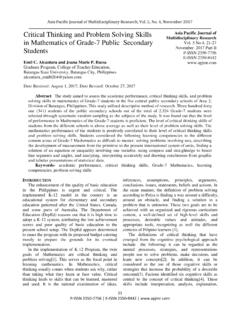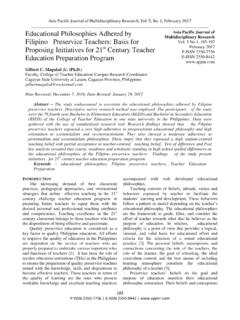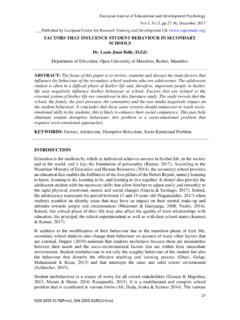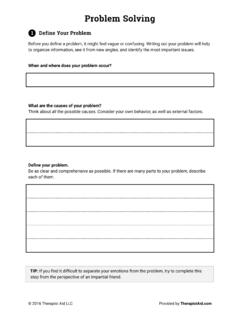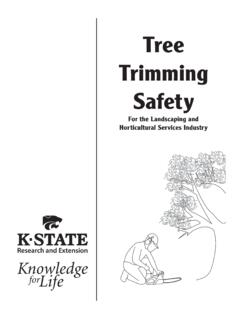Transcription of Factors of School Effectiveness and Performance of ...
1 Asia Pacific Journal of Multidisciplinary Research, Vol. 5, No. 1, February 2017 _____ 73 P-ISSN 2350-7756 | E-ISSN 2350-8442 | Factors of School Effectiveness and Performance of Selected Public and Private Elementary Schools: Implications on Educational Planning in the Philippines Gilbert C. Magulod Jr., ( ) College of Teacher Education/ Campus Research Coordinator, Cagayan State University at Lasam, Cagayan Province, Philippines Date Received: December 12, 2016; Date Revised: February 6, 2017 Asia Pacific Journal of Multidisciplinary Research Vol. 5 , 73-83 February 2017 (Part II) P-ISSN 2350-7756 E-ISSN 2350-8442 Abstract What defines effective School is the necessity of the School community to tailor interventions to improve quality of education. This study determined the Factors of School Effectiveness and level of School Performance of private and public elementary schools in the Second Congressional District of Cagayan Province, Philippines.
2 The study made use of mixed-method research. For quantitative, the descriptive correlational method was used to identify the relationship between School Effectiveness and School Performance . Factorial analysis was also used to identify the principal components of School Effectiveness of private and public elementary schools. The participants of the study were the 182 public and private elementary School principals and teachers from the 20 sampled schools. School Effectiveness was measured using the seven correlates of effective schools. On the other hand, the level of School Performance was gauged through the National Achievement Test (NAT) results for the past three years. The qualitative part of the study focused on the School Effectiveness practices and NAT practices of selected private and public elementary schools.
3 The findings of the study revealed that the level of School Effectiveness of both private and public elementary schools was excellent. However, test of difference showed that public schools exhibited stronger home- School relations than the private schools. In terms of the level of School Performance , public schools perform better than the private schools for the past three years. Significantly, there exists a strong positive relationship between School Effectiveness and School Performance . The factorial analysis revealed that among all the correlates of School Effectiveness , School leadership competency and professional collaboration influenced the Performance of both schools. Recommendations of the study can help the government and School officials to plan appropriate strategies in improving the quality of schools Effectiveness .
4 Keywords School Effectiveness , NAT Performance , public and private elementary schools, educational planning INTRODUCTION Quality education is the need of modern societies. The capacity of an educational enterprise to provide the relevant learning experiences for learners in the dynamic and ever changing world has driven schools to become responsive since the 21st Century education demands for better preparation of learners in the basic education to be equipped with the necessary knowledge, skills, values and attitudes. If learners in the basic education have strong foundation for learning, then when they get to higher education they will become innovative and competitive, and ultimately, they will become successful contributors for national development.
5 The efforts and synergy to make schools a potential place for every learner is a challenge for all School administrators today. Having the conviction that schools can make the difference in the lives of learners, schools must determine the different Factors that will support students to attain human flourishing. The School must have an internal environment consisting of its physical set-up, management, quality of teachers, effective teaching methods, positive social and learning conditions, and strong home- School link which constitute everything about the School as an ideal learning environment. School Effectiveness refers to the decisive effect of enhancing conditions at School level [1]. It encompasses all important variables which are related Magulod Jr.
6 , Factors of School Effectiveness and Performance of Selected Public and Private _____ 74 P-ISSN 2350-7756 | E-ISSN 2350-8442 | Asia Pacific Journal of Multidisciplinary Research, Vol. 5, No. 1, February 2017 (Part II) to teaching, instruction, management, students learning and community involvement. Effective schools focus on the achievement of students and the interplay of other Factors such as learning motivation, classroom management, student learning attitude and participation. School leaders and managers are prompted to initiate plan that will spawn the development of schools by having the idea that good schools are associated with the characteristics of having strong instructional management, clear learning expectations, and have the characteristics of a conducive learning environment.
7 Many of the causes of failure and deterioration of schools today are attributed to Factors such as the lack of curriculum framework, mismanagement, poor staff relationship, ineffective teaching practices, and poor academic Performance of students. The issue of how to make schools effective becomes a pressing concern for educators to search for the important Factors that will spur their Effectiveness . It has been suggested that the unique characteristics of effective schools correlate with student success [2]. These correlates are the means to achieve high and equitable levels of student learning. They embody the idea that all children will learn the essential knowledge, concepts and skills needed, so that they can be successful [3].
8 In the perspective of this study, the seven correlates of effective School model by Lezotte [4] were considered to describe the Factors of School Effectiveness in the Philippine context. These Factors are accepted as powerful indicators of successful environment for all children to learn, regardless of their socioeconomic status in the world. These seven Factors were given brief descriptions. A safe and orderly School environment refers to how organized, purposeful, and businesslike atmosphere the School promotes. It encompasses the indicators that the School becomes a conducive learning environment when it caters for the needs and development of the students. In an effective School , there is an orderly, purposeful, businesslike atmosphere which is free from threat or physical harm [5].
9 The high expectations for success as a factor of effective School pertains to how the School promotes a climate of high learning expectation to the learners where the teachers and staff of the School exhibit the idea that students can be at their best. Research by Lezotte [6] revealed that in an effective School , there is a climate of high expectations in which the staff believes and demonstrates that all students can obtain mastery of the School essential curriculum. Meanwhile, instructional leadership as a factor of effective School describes how the School heads as instructional leader ensure that the mission of the School is being fulfilled. It focuses on the ability of the principal to monitor quality instruction and perform supervisory powers. The schools require good leaders to organize the process of teaching and learning to ensure that the mission of the School is achieved [7].
10 In the same manner, Horng and Loeb [8] describe effective schools through the lens of instructional leadership. The opportunity to learn and student time on task as correlate implies how the School provides and ensures adequate learning materials and time for effective instruction. Lezotte [9] argues that consideration should always be given to instruction materials and the limited time for effective learning. Meanwhile, positive-home School relations as correlate explains how the School establishes home- School link. Henderson and Berla [10] states that when parents are involved in their children s education at home, they do better in School . Further, frequent monitoring of students progress describes how the teachers are able to assess learning by students and giving them feedback to improve learning.
